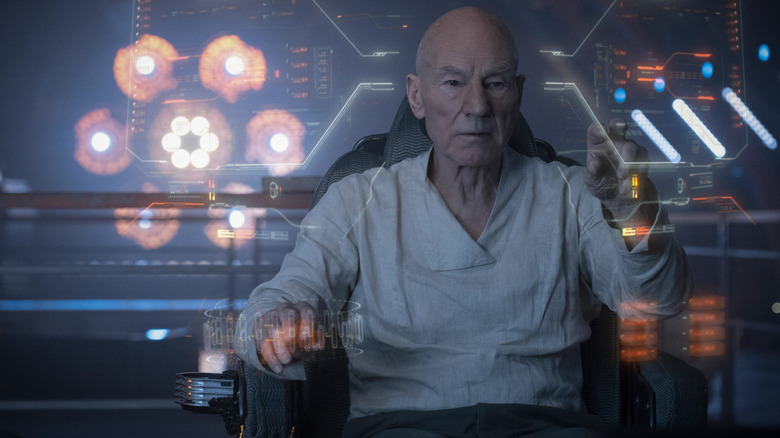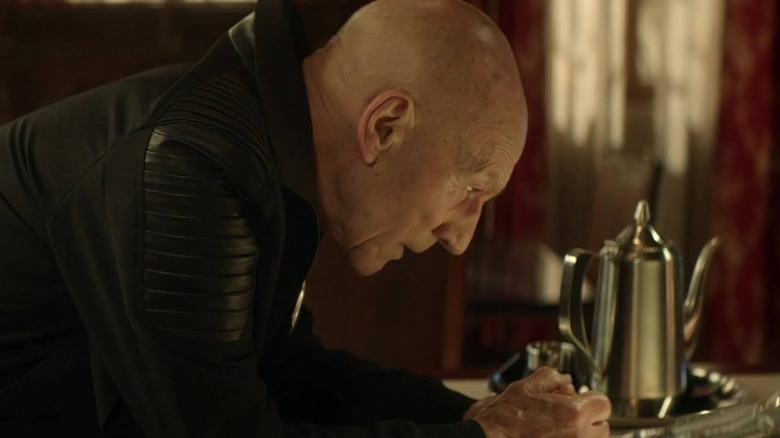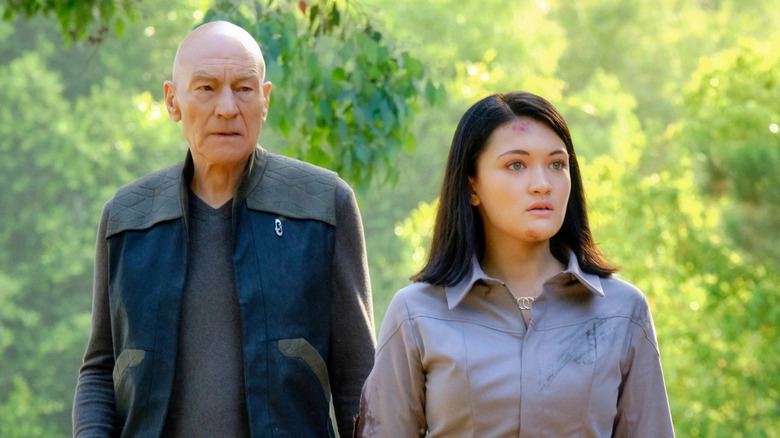Playing An Older Picard Is A Double-Edged Sword For Patrick Stewart
Patrick Stewart has told an amusing anecdote about a moment during the first season of "Star Trek: The Next Generation" when he, trying to be as serious as possible, expressed concern about the flip, silly behavior of his costars. Stewart recalled gathering the cast together to, essentially, admonish them, telling "CBS This Morning":
"I lectured my fellow cast members about some of the fooling around that was going on on the set, and the games that they were playing and the singing and the jokes and the ruining shots. And there was this horrible silence."
Stewart seems to have alienated his costars in that moment. And it got worse:
"[I]t was Denise Crosby who said to me, 'Trick, come on, we gotta have some fun!' And I said, 'We are not here to have fun.'"
Upon saying that phrase, "we are not here to have fun," Stewart seems to have realized how stuffy he was being. He quickly knew he perhaps needed to loosen up. By his own admonition, he became a sillier person as the show went on.
Playing Captain Jean-Luc Picard — a gig that began in 1987 when Stewart was 47 years old — has been a journey of change and growth for Stewart. The character appeared in seven seasons of "Next Generation," and four feature films, presumably wrapping up his adventures in 2002 with the release of "Star Trek: Nemesis." In 2018, at age 78, Stewart returned to the role for "Star Trek: Picard," a successful show that recently wrapped its second season.
In a 2022 interview with NPR, Stewart talked about how much he's grown as an actor since 1987, along with the struggles of continuing a role, however familiar to him, going into his 80s.
Dead-letter perfect
In the NPR interview, Patrick Stewart began by pointing out how different playing Picard is now in practical terms. It's not as easy to memorize lines at age 79 than it was at age 47. A workweek now has a much more structured layout, and Stewart, a professional, wants to make sure at least two of his five days are as good as can be. The rest of the week will also go well, but he prefers to start strong:
"Well, learning lines is a bigger challenge than it used to be. I used to learn lines so easily. Now when we're shooting the series, I have the week's work laid out in front of me. And over the weekend, I make sure that I am DLP — dead-letter perfect — of the first two days of work, Monday and Tuesday. And then I'm really familiar with Wednesday and quite familiar with Thursday and Friday so that each day, I will be on top of what I have to do insofar as just learning the lines goes. And I stick with that."
"Star Trek" in particular appears to make for a more difficult task of learning lines. The franchise at large is rife with mythology and an extensive proper name vocabulary all its own — indeed, "Trek" inspired a language all its own — and that's in addition to its tendency to include a great deal of multisyllabic technobabble as a matter of course. Stewart may not have to keep track of the franchise's extensive backstory and expanded universe — it's likely he's not catching up with, say, "Star Trek: Lower Decks" — but he surely needs to sound convincing. He's Jean-Luc Picard, after all.
The ease of playing 79.
Parick Stewart admitted that returning to Picard at age 79, when the character is supposed to be even older, makes some of his acting more authentic: He doesn't have to pretend not to be his age. Indeed, by "Picard" season two, the character is rounding age 96. Stewart felt comfortable acting his age when coming back to Picard, as any signs of age in the character would be experienced just as strongly by him:
"[O]ne of the nice things about being 79 and playing a man who's a couple of years older is I don't have to act it. I just — I'm 79. I'm 80 in a month's time. So I mean, no one can accuse me of being a fake 80-year-old because it's what I am. And my, you know — I forget that I've said things. And I forget people's names and telephone numbers and all of that. My wife is blessedly patient with me."
In other words, Stewart didn't have to pretend like he was younger. It was a relief to merely be who he was. It also may help that, in "Star Trek: Picard," the character is no longer the captain of a starship and no longer wears a uniform. He is merely a retiree, enjoying life on his family-owned vineyard. There was no longer any pressure to be an action hero or a sharp-thinking commander put in stressful situations. In "Picard," the action is handled by his costars.
Braver
As anyone who has reached a certain age can attest, a lot of anxiety that accompanies youth can eventually be outgrown. This was certainly the case with Patrick Stewart, who feels he is more daring and less pressured an actor now than he was decades ago. He appears to be more confident in his decisions, and is willing to push himself further than in the past. He's become more instinctual, as he continued to NPR:
"I'm braver than I was when I was 35. I am not averse to risk-taking. And I don't judge myself. I used to do that so much. 'Ah, Patrick, that's not good enough. That's not good enough. You could've done that differently. You could've done it better.' That gets in the way of spontaneity and real feeling coming into something. So I'm braver now than I was when I was much younger."
He may not have the exact mental acumen as he did 30 years ago, but Stewart has, in 2022, affected a more natural style of acting. The "We are not here to have fun" Stewart has been replaced with someone quite the opposite: an actor who leads by emotional faculties. While Stewart is extensively, classically trained, his new approach to his craft seems far less based on overwhelming intellectual rigor. At almost 82, Stewart is finally confident.
The third season of "Star Trek: Picard," already complete, will air in the spring of 2023. Also returning will be Marina Sirtis, Gates McFadden, Brent Spiner, LeVar Burton, Michael Dorn, and Jonathan Frakes. It will be the last time Stewart will play Picard.



